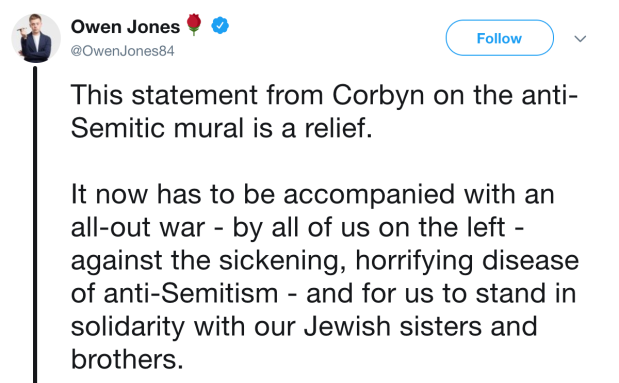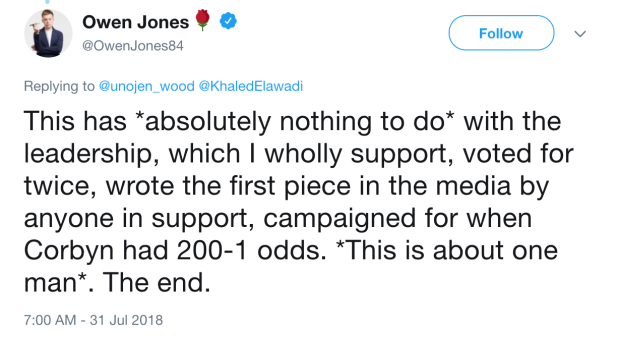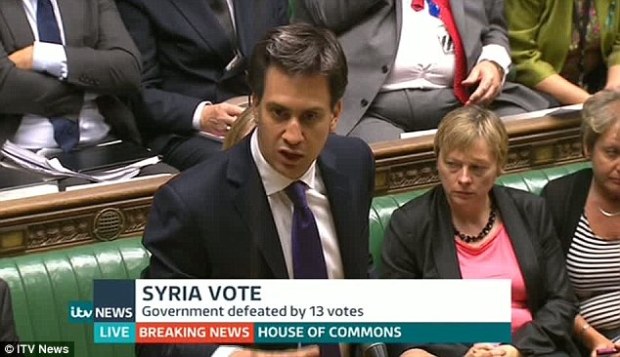By David Paxton
To observe Owen Jones at work is to see somebody carefully negotiating difficult terrain. He has been the vanguard for this latest form of full-time campaigner-cum-party surrogate disguised as a commentator. People for whom purpose and credibility are at constant odds with each other.
Jones is both inside the tent and outside and does wondrous work trying to square the circle. “All commentators are biased it’s just that I’m honest about it” is the line and it’s a typically good one. But the tension many political commentators experience between having friends in the game, being a player yourself, and commentating on that game, has rarely been more obvious than it is with Jones. And so his output constantly resembles tactics far more than just a writer trying to make sense of the world from their particular vantage point. And it’s those contortions (see him on Brexit), the tightrope-walking, and most of all, the tactical silences from the inside man of the Corbyn show, that made for such great spectator sport.
The Labour antisemitism saga has changed all that.
As a reminder of how far we’ve come it’s worth re-reading this Jonathan Freedland piece from March 2016. It’s obviously fair and, by today’s standards, very tame about Corbyn. It expresses genuine, and now obviously well-founded, fears within the Jewish community. It repeats the line that was standard for so long:
Which brings us to Jeremy Corbyn. No one accuses him of being an antisemite. But…
Corbyn’s now infamous response to this article, as recorded in the disastrous VICE documentary, went:
The big negative today is the Jonathan Freedland article in The Guardian. Utterly disgusting, subliminal nastiness, the whole lot of it. He’s not a good guy at all. He seems kind of obsessed with me.
You can’t re-read this without seeing how the current move from problem to crisis was always nailed on. A critic is the enemy and the problem was not to be with Jeremy. Ever.
When the associations with antisemites first started appearing in the media during Corbyn’s leadership campaign, Jones addressed “these guilt-by-association smears” and explained that:
people like me – who support the Palestinian cause out of a sense of justice – will risk meeting or sharing platforms with people who indulge or possess anti-Semitic views.
This is the argument from accidental meeting. It could happen to anyone that supports the Palestinian cause for long enough. You take a risk by doing good. In fact, the harder you try for peace the more likely you are to get into trouble.
The corollary of this argument is the damaging lie that nobody can seek to do right by Palestine without enduring constant scandal. But of course, when faced with real problems these tireless fighters of antisemitism would act.
When Jones’ friend Jackie Walker was suspended by Labour for antisemitic comments, Jones certainly did act. He declared the ‘outrageous suspension’ as having ‘no justification’ and called upon his followers to email the party general secretary to have her reinstated. When Walker reverted back to type, Jones did not address his error, or even describe her actions as antisemitic. He called them ‘totally unacceptable’ and said no more, while dropping Jackie Walker down the memory hole.
Around this time Jones was simultaneously declaring how seriously Labour must take antisemitism. Sure, it still had nothing to do with Corbyn but it must be fought. Except when it’s a smear, that is. He set up this dual position early: we must fight it AND it can be used by nefarious political opponents. As if that matters.
Antisemitism is too serious to become a convenient means to undermine political opponents… There’s no excuse for the left to downplay it, or to pretend it doesn’t exist within its own ranks. Rather than being defensive, the left should seize any opportunity to confront the cancer of antisemitism and eradicate it for good.
This two way position, the ‘walking and chewing gum‘ has served Jones well. He can constantly declare the necessity to fight antisemitism but if the allegations get close to home and affect political expediency, then he can remind us that it can also be ‘a convenient means’. Are there other forms of bigotry that have those fighting it accused of exaggeration by Jones? What utility does this nebulous accusation of bad faith have beyond cover for the guilty? And what is one meant to do with the information? The aims Jones claims to have would be best served without his efforts to leave that constant doubt in the air. It’s rarely specifically applied but instead just allowed to linger and be hinted at as applicable.
In March this year, David Collier revealed the fruits of his long investigation into the Facebook group ‘Palestine Live’. I wrote about it here. Jones, who had previously been vocal about other Facebook group revelations from Tories, said nothing. The scandal blew up. Here was a huge discussion about antisemitism in Labour, the leader of his party was implicated, it went on for days. And nada. Zip. The public commentator, honest about his bias, intent on addressing antisemitism, decided not to comment.
Then the antisemitic mural resurfaced and kicked up a major storm. Once again Jones said nothing. Nothing, that is, until Corbyn finally released a statement. It turned out to be a fuss about nothing, of course, because Corbyn simply hadn’t looked at the content of the controversial mural he was supporting during a controversy about the content of the mural. Within moments of the statement, Jones piped up with a thread to express his ‘relief’ that there was nothing to worry about because Corbyn had a completely plausible explanation. I think we are expected to believe that before seeing that statement Jones was poised to erupt in righteous fury after a period biding his time.
It was in that particular thread that Jones declared ‘all-out war’ against Labour antisemitism. And even included an emoji of a flexing bicep to underscore the muscular vigour with which he would undertake this ‘ceaseless war’.


Also within the thread he explained why he knows Corbyn is not ‘anything close’ to an antisemite, he wrote:

It is said that on the matter of antisemitism it’s Jews that should be listened to. Jones is meeting this idea some of the way by listening to Jews who share his opinions. Of course, when the Jewish Margaret Hodge declared Corbyn to be an ‘antisemite and a racist’, Jones declared this ‘a lie and a disgrace’. But again the message is clear, Corbyn doesn’t have ‘even the slightest softness when it comes to antisemitism’.
Circumstances quickly provided Jones with an opportunity to deploy his battalions when, in response to the mural, various Jewish groups and organisations, and many unaffiliated people merely concerned, decided to muster on the lawns of Westminster and demonstrate their anxiety regarding the leadership and the current malaise. I attended the event and met many people who are not regular protestors or enthusiastic joiners but felt they had no other choice. Their feeling can be seen in the choice of their slogan, ‘enough is enough’. Usually a protest is catnip for Jones and one would expect him to be all over this like rash on a baby’s behind. Instead he resigned himself to merely commenting that one of the people present was being insincere and, as Rob Francis notes:
Earlier that day, he’d also shared an article by Jewish Voice for Labour, a group set up last year which opposed Tony Greenstein’s expulsion from the party. He subsequently deleted the tweet as he claimed he’d got confused with a different organisation (Jewish Voice). It’s possible, but I’d note that 1. his original tweet said he wanted to provide some “balance” on the subject (balance?! What balance is there to provide on an anti-racist march?) and 2. whether accidental or not, the upshot was to give JVL a lot of publicity.
And so, for Jones, the war was over. And before it ever really began. His actions then and subsequently have been of a familiar type, enough outrage to keep his anti-racist credentials up but always with a view of protecting Corbyn and the project. Always ready to call things smears and complain about ‘weaponisation’. No criticism of value, no action of meaning.
Then we get to the last fortnight.
First a video surfaced of Corbyn addressing a crowd where he compared the length of the blockade of Gaza to the siege of Leningrad and the battle of Stalingrad combined. Labour have since stated that he was not comparing the actions of the IDF to the Wehrmacht, but merely the timeframe. As if the rhetorical worth of Leningrad and Stalingrad lies in comparative time frames (for example, the Labour antisemitism saga has now been going on for 7.2 Stalingrads). This, though perhaps at the mild end, is a comparison between the actions of contemporary Israel and the Nazis.
Jones said nothing.
Another video surfaced from one of Corbyn’s regular appearances on the propaganda station of Iran (his appearances on Press TV, including hosting a show, should be reason enough for censure). In the interview he takes up the cause of a convicted Hamas terrorist and calls him ‘brother’. Then he was asked to address the 2012 Sinai attacks. Corbyn suggested it unlikely that a Muslim would attack a Muslim during Ramadan and then, without any evidence beyond an appeal to the conspiracist’s favourite logic, cui bono, he confesses to ‘suspecting the hand of Israel’ behind the terrorist violence which included an attack on Israel itself. A false flag terrorist attack against their own country. This is straight conspiratorial antisemitism.
If one contrasts this with his reactions to the Skripal poisoning, where, despite lots of good evidence and expert opinion fingering the Russian state, Corbyn worked hard to avoid accusation. Treating Israel by different standards.
Jones said nothing.
Just when it seemed it couldn’t get worse, it was revealed by James Vaughan that Corbyn hosted and chaired a meeting on Holocaust Memorial Day as part of a tour reportedly titled, “Never Again for Anyone – Auschwitz to Gaza”.
The leaflet handed out at the event juxtaposed Holocaust victims with people of Gaza.

Holocaust minimisation, Holocaust reversal, take your pick.
The co-organisers of the event were the Scottish Palestine Solidarity Campaign (SPSC) who, as Vaughan has pointed out, are content posting images like this on their website:


The main speaker at the event was a survivor of Auschwitz. He claimed that the Israelis ‘act like the Nazis’ and that Elie Wiesel is the ‘high priest’ of the Zionists’ ‘Holocaust religion’. In a rare act of apparent contrition Corbyn released the following statement:
Views were expressed at the meeting which I do not accept or condone. In the past, in pursuit of justice for the Palestinian people and peace in Israel/Palestine, I have on occasion appeared on platforms with people whose views I completely reject. I apologise for the concerns and anxiety that this has caused.
The apology, and the admittance that actions have caused anxiety, appeared to some as progress by Corbyn. I am more cynical. When an Auschwitz survivor starts saying these things, which I find repulsive, I accept that as a non-Jewish person, so detached from the Holocaust in comparison, I can’t really tell him to stop. I’m just not in the position to do so. And nor is Corbyn, and he knows we know this. Jones was quick to use this dilemma.
So despite the apology there apparently wasn’t much to apologise for. Always tactics. And it’s quite clever actually. Unfortunately, it ignores certain facts:
- Reports suggest that other Jews in the audience tried to dispute the thesis of the main speaker. Corbyn, as the chair, wouldn’t allow them to and saw to it that those in disagreement or ‘completely rejecting’ were removed. Including another Holocaust survivor.

- When sat there, Corbyn might have felt unable to protest (as Jones suggests), but this is to start the story in the middle. Corbyn didn’t have to be there at all, and what was said at the meeting could hardly have been a surprise, considering the theme. He chose to be in that position and now chooses to pretend that he had no idea.
- Corbyn didn’t just ‘appear on a platform’ as per his statement and Jones’ theory of unfortunate luck when being pro-Palestinian doesn’t stick. He gave the platform in parliament. He hosted the event. “I have shared platforms with people I gave platforms to” isn’t the excuse he thinks it is.
- The survivor wasn’t the only person of concern on the platform.
- And this really is the rub: Corbyn hosted the event on Holocaust Memorial Day, with a theme clearly implying that Israel was guilty of similar crimes to those commemorated. It’s one of the most offensive things I have heard a contemporary politician knowingly do.
Before we leave the Nazi/Israel comparisons I am reminded of what a clever socialist once said about them.
You get this comparison sometimes, a deeply offensive comparison, between the actions of the Israeli government and the Nazis. And I’ve heard that said by people who support Palestinian justice before… The reason that comparison is made is to cause deliberate offence.
We can only assume that Jones meant everyone apart from Jeremy Corbyn.
The fortnight wasn’t over.
It was also revealed that both Corbyn and McDonnell campaigned to have the word ‘Holocaust’ removed from Holocaust Memorial Day. Jones said nothing.
Though it was unacceptable to Jones when Jackie Walker complained about Jewish monopolisation of the Holocaust, we can only assume that silence is consent when it comes to Corbyn’s efforts.
And finally (ignoring all the other incidents not involving Corbyn), there’s the debacle of the “JC9”.
Weeks ago, it was reported that National Executive Committee member and candidate, Peter Willsman, had ranted about ‘Trump fanatics’ in the Jewish community as a reason for the complaints about antisemitism. He further suggested that he had never seen evidence of antisemitism within the party despite his sitting on the body charged with investigating cases when they arose. Corbyn was present at the meeting. So were the rest of the NEC. The report was ignored by all and when Momentum announced their slate for the NEC elections they called them the #JC9 (Jeremy Corbyn 9), and Willsman was one of them.
Jones expressed his approval:
But audio of the rant was released and the contents were bad. A decision about Willsman was obviously made because, in perfect Whatsapp synchronisation, the new members of the Mystery Gang (now with added Communism) decided they were for the #JC8.
Predictably, Jones received push-back from the Corbyn cultists for abandoning Willsman. In response, the next morning he posted the following:
And there we have it. Jones’ straddling of the divide is finally laid bare for the absurd sham that it is. We are told the problem exists on the ‘fringe’ when discussing conduct during a meeting of National Executive Committee, attended by the leader, Jeremy Corbyn, and involving one of a group of candidates that use the leader’s initials as a handle. Conduct that was not acted upon until audio was released to the public.

The problem of course is ‘just one man’. Much like the other individuals who Jones has had to discard once the discarding was approved policy. And so, like Jackie Walker, the fringe Peter Willsman will go down the memory hole.
Now we reach today.
Corbyn has just had published in The Guardian a piece titled I Will Root Antisemites Out of Labour. With the exception of a slightly panicked tone and an accusation that the Jewish press are exaggerating, it says nothing we haven’t already heard. In fact, in parts it’s simply copied and pasted from the article he put out in April:
Jones is fully aware of the April piece as he recommended it just two days ago. He described today’s slight rehash, rather wonderfully, as ‘exceptional’.
For three years there’s been incident after incident involving Corbyn followed by a litany of ridiculous excuses. “I didn’t see”, “I didn’t look closely enough”, “it was just diplomacy, I didn’t mean it”, “I shared a platform but I rejected the view without actually rejecting it”, “I don’t recall”, “I wasn’t aware of his past”, “I wasn’t chairing the meeting”. Again and again. Over and over. Not a single one of these excuses would be granted to any one of Jones’ political enemies but a torrent of them all added together are declared reasonable when it comes to Corbyn. According to Jones, Corbyn is just the unluckiest man in the world.
It is now inescapable that a great proportion of the current concern felt by the Jewish community about Labour and antisemitism is the fault and responsibility of Labour’s leader and a result of his actions and inactions over decades. The people trying to point out this obvious fact are gaslit by Jones who tells them, in their distress and during a fortnight where serious and repeated allegations have again been brought to light about the conduct of Corbyn, that they are gullibly falling for ‘smears’.
I believe that Corbyn is, in fact, an antisemite. Parsimony demands it as the excuse-making required to draw any other conclusion is now ‘just beyond ludicrous’, to coin a phrase. But if Jones doesn’t wish to admit Corbyn is an antisemite, or can’t see it, then that’s one thing. We can agree to disagree. But to be unable to link Corbyn to the problem, to not allow him to be responsible for his actions, is only to prolong the agony felt by others.
How, for example, are Labour meant to have a nuanced debate about the IHRA definition of antisemitism — which Jones claims to want — when it’s clear, be it a coincidence or not, that Labour’s changes to that definition provide escape clauses for the past actions of the very leader seeking to implement those changes? How is Jones going to be a part of that debate when he can’t bring himself to address any of the specific concerns about the leader?
There is no shortage of those that deny there is any problem at all. And they intrigue me. The question keeps coming up ‘don’t they know or are they lying?’ Is the loyalty and hope blinding them?
You can’t know a man’s mind, but with many of them I am sure they honestly can’t see or cannot understand it. Those who think this is made up by anti-Corbyn cabals are blind or/and stupid – but I believe they believe it. The flaw for Jones is that while keeping his anti-racism credentials as high as possible he has been adept enough to spell out what antisemitism is, and how it manifests. He simply can’t not know. Ignorance isn’t an excuse. As he once said:
The only way the left will come to the positions that I want, is that if people like me speak out passionately and argue this case which is to take antisemitism seriously…
This speaking out, alas, precludes any criticism of the person chiefly responsible for the problem.
So it’s worse than the deniers. In fact, it’s the worst. He’s telling the Jewish community ‘I am on your side’ while also working to undermine the solutions to their qualms. The problem is at the top of the party and Jones tells everyone it’s just ‘the fringe’. It’s just smears. (I have sometimes wondered if this isn’t all just a grand attempt to have that word redefined).
At the end of the movie Primary Colors, the protagonist, Henry, is in crisis. He has seen the politician for whom he works, Jack Stanton, fail to live up to the principles he espouses. Stanton turns on the full persuasion. “This is the price you pay to lead – you don’t think Abraham Lincoln was a whore before he was a president?”. It’s a classic dilemma best summed up as ‘systems vs goals’. Or if you prefer, ‘principles vs goals’. Compromise your principles a little, but that’s ok when you accept that your goal is the greater principle in the equation. I have come to accept that it’s idealistic and naive not to accept the necessity of some of that compromise. It’s the world of politics. And we probably forgive Henry for his eventually accepting. But where is the line?
I’m reminded of something Jones said in his ‘All-out War’ thread:

One can but guess what Jones thinks of the presentation these days as the leader of the party is credibly called a racist by his own MPs and endorsed by America’s Jew haters. But he was willing to abandon Corbyn to protect his dream of socialism. Good for him. However, since the election that dream is tied to Corbyn, and this time it’s just within reach, so Jones is willing to abandon the Jewish community instead. Wherever the line is, I posit that’s the other side of it.
I’ll finish with a prediction:
If Corbyn cannot get out from under this scandal — and the until very recently unthinkable happens — and he is moved aside then, as if by magic, Jones will publicly accept that everything wasn’t a ‘smear’. He’ll never call him an antisemite, but he will move from his current position and accept fault the moment he is politically able. And that’s his morality, and worth as a commentator, right there. And then Jones will once again set about walking his commentator/campaigner high-wire while trying to bring about his beloved dream of turning Britain into the Durham Miners’ Gala. But it just won’t be so funny any more.
In the meantime, Jones is playing all those that will listen to him for fools. By lamenting the distrust within the Labour party on this issue while consistently refusing to make any negative comments about Corbyn, he’s pleading for a cure while working day and night to sell you the disease.
















